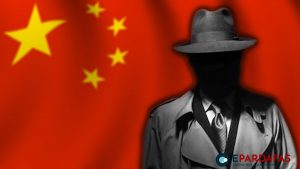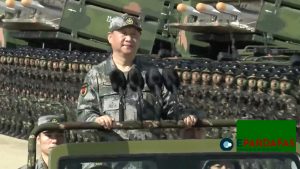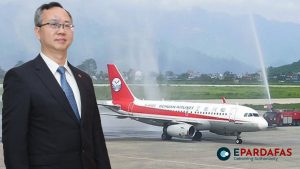
Xi Jinping’s Call for Stricter Religious Control Raises Concerns
Urumqi, Xinjiang — President of China, Xi Jinping, made a significant statement during his visit to Urumqi, Xinjiang, at the end of August, emphasizing the need to strengthen efforts in controlling what he termed “illegal religious activity.” While this statement may have pleased some within the Chinese leadership, it has sparked criticism and condemnation from various quarters.
During his visit, Xi Jinping was seen alongside Chen Wenqing, Secretary of the Chinese Communist Party’s Central Political and Legal Affairs Commission. This position effectively makes Chen, who is also a member of the Politburo and a former Minister of State Security, the de facto leader of public security in China.
One aspect of this visit that has received less attention at both national and international levels is Chen’s prior stop in Hezuo City, located in the Gannan Tibetan Autonomous Prefecture, part of Gansu province. Remarkably, before heading to Xinjiang, Chen conducted a thorough visit to Gansu, with Hezuo City as his final destination.
The Gannan Tibetan Autonomous Prefecture is home to over 400,000 Tibetans, constituting 57 percent of its population. This demographic reality highlights that Tibet historically encompassed a larger territory than what China now designates as the Tibet Autonomous Region, known as Xizang.
During his visit to Gannan Prefecture, Chen conveyed Beijing’s expectations to local authorities, urging them to “create a safe and stable social environment to promote Chinese-style modernization,” uphold “scientific culture,” and combat “separatism” and “superstition.”
Even before Xi Jinping’s speech in Urumqi, Chen had already characterized Xinjiang as a model for fighting “separatism” and the utilization of religion to critique the Chinese Communist Party (CCP). In alignment with Xi’s later statements in Xinjiang, Chen lauded the “Fengqiao Movement.”
According to information cited from the Bitter Winter page, the Fengqiao Movement was initiated by Mao Zedong in 1963 in Zhejiang province, marking the outset of the Cultural Revolution. The movement comprised “four purges,” targeting “landlords,” “rich peasants,” “counterrevolutionaries,” and “criminals,” who were arrested, publicly humiliated, and in some instances, subjected to torture and execution. Notably, those who adhered to independent religions were also categorized as counterrevolutionaries and “evildoers” within the Fengqiao Movement.
The essence of Chen’s statement is that the same persecution endured by Uighur Muslims in Xinjiang could potentially be extended to Tibetan Buddhists in Gansu.
Chen’s itinerary also included a visit to the Linxia Hui Autonomous Prefecture in Gansu, a region with a population consisting of over 50 percent minorities, including Tibetans and Hui Muslims. During his visit, Chen cautioned against opposing the “Sinification of Islam,” which refers to the movement aimed at removing authentic elements of Islam or Arab culture, often manifesting as mosque renovations.
Xi Jinping’s call for tighter control over religious activities and Chen Wenqing’s subsequent visits to regions with significant minority populations have raised concerns about the potential impact on religious freedoms and cultural preservation in China. The international community continues to monitor these developments closely.
















Comments